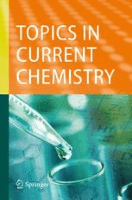
Topics in Current Chemistry
Scope & Guideline
Unveiling the latest breakthroughs in chemistry.
Introduction
Aims and Scopes
- Synthetic Methodologies:
The journal features extensive research on new synthetic techniques, including metal-catalyzed reactions, bioorthogonal reactions, and innovative coupling methods, highlighting their efficiency and applicability in diverse fields. - Nanomaterials and Their Applications:
There is a significant emphasis on the development and application of nanomaterials, particularly in biomedical research, catalysis, and environmental remediation, showcasing their unique properties and potential. - Computational Chemistry:
The integration of computational methods in chemistry is a core area, with a focus on predicting reaction mechanisms, molecular modeling, and the design of novel compounds, enhancing the understanding of chemical behavior at the molecular level. - Biomedical Chemistry:
Research articles often explore the intersection of chemistry and biology, including drug design, bioimaging, and therapeutic applications of chemical compounds, which are critical for advancing medical science. - Environmental Chemistry:
The journal addresses the role of chemistry in environmental sustainability, focusing on green chemistry practices, pollutant remediation, and the development of materials for environmental applications.
Trending and Emerging
- Bioorthogonal Chemistry:
There is a notable increase in research concerning bioorthogonal reactions, which allow for selective labeling and imaging of biomolecules. This trend is crucial for advancements in bioconjugation techniques and targeted drug delivery. - Nanotechnology in Medicine:
Emerging nanomaterials, particularly as nanozymes and in drug delivery systems, are increasingly prominent in recent publications, reflecting a growing interest in their biomedical applications and therapeutic potential. - Deep Learning in Chemistry:
The application of artificial intelligence and deep learning techniques for protein design and molecular modeling is gaining importance, showcasing a shift towards integrating computational approaches with experimental chemistry. - Sustainable and Green Chemistry:
Research focusing on environmentally friendly synthesis methods and catalytic processes is on the rise, highlighting the importance of sustainability in chemical research and development. - Advanced Photocatalysis:
The exploration of photocatalytic processes for energy conversion and environmental remediation is trending, reflecting an increased interest in harnessing light-driven reactions for practical applications.
Declining or Waning
- Traditional Organic Synthesis:
There appears to be a declining interest in conventional organic synthesis methods, as researchers increasingly favor more innovative and efficient approaches that incorporate advanced catalysis and green chemistry principles. - Basic Inorganic Chemistry:
Papers focusing solely on traditional inorganic chemistry topics, such as fundamental coordination chemistry without practical applications, are becoming less frequent, indicating a shift towards more applied and interdisciplinary research. - Bioinorganic Chemistry:
Although still relevant, bioinorganic chemistry topics are less frequently addressed, possibly overshadowed by more focused themes on bioorthogonal reactions and medicinal chemistry, which directly impact drug development.
Similar Journals

JOURNAL OF CHEMICAL SCIENCES
Empowering Chemists: Open Access to Scientific ExcellenceThe JOURNAL OF CHEMICAL SCIENCES, published by the Indian Academy of Sciences, is a premier academic journal that serves the global community of chemists and researchers. With an ISSN of 0974-3626 and an E-ISSN of 0973-7103, this journal is pivotal in disseminating high-quality research across diverse areas of chemical sciences. As of 2023, it holds a respectable Q3 ranking in the field of Chemistry (miscellaneous) and ranks #215 out of 408 in General Chemistry according to Scopus, reflecting its commitment to advancing the discipline. Operating in an open-access format, the journal ensures that research findings are readily accessible to a broader audience, fostering collaboration and innovation. Established in 1980 and continuing to evolve, the journal's scope encompasses fundamental and applied chemistry, and aims to bridge gaps between theoretical and practical applications. With a mission to support the scientific community, the JOURNAL OF CHEMICAL SCIENCES is an essential resource for researchers, professionals, and students alike, providing a platform for the exchange of groundbreaking ideas and discoveries.
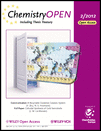
ChemistryOpen
Unlocking the Future of ChemistryChemistryOpen is a leading open access journal published by WILEY-V C H VERLAG GMBH, dedicated to advancing the field of chemistry. With its ISSN 2191-1363, this journal has been a vital platform since its inception in 2012, promoting unrestricted access to innovative research findings and critical reviews in various chemistry domains. As a testament to its growing influence, ChemistryOpen has achieved a commendable Q2 quartile ranking in the 2023 Chemistry (miscellaneous) category, which highlights its quality and impact within the academic community. Researchers, professionals, and students benefit from the journal's commitment to making high-quality research accessible, facilitating knowledge transfer and collaborative insights among chemists worldwide. The journal's transparent open access model ensures that groundbreaking discoveries and methodologies are readily disseminated, fostering a culture of innovation and interdisciplinary dialogue in the ever-evolving landscape of chemistry.
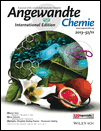
ANGEWANDTE CHEMIE-INTERNATIONAL EDITION
Advancing Chemistry Through Rigorous ResearchANGEWANDTE CHEMIE-INTERNATIONAL EDITION, published by WILEY-V C H VERLAG GMBH, stands as a leading journal in the fields of Chemistry and Catalysis, holding a prestigious position with a Q1 ranking in both categories as of 2023. With an ISSN of 1433-7851 and an E-ISSN of 1521-3773, this esteemed publication has been an invaluable resource for the global scientific community since its inception in 1962. The journal's impact is further underscored by its remarkable Scopus rankings, where it occupies the 13th place among 408 journals in General Chemistry and the 4th place among 68 in Chemical Engineering - Catalysis, marking it in the 96th and 94th percentiles, respectively. Although it does not offer Open Access, ANEWANDTE CHEMIE-INTERNATIONAL EDITION remains essential for researchers, professionals, and students seeking to stay abreast of cutting-edge developments and innovations in chemical sciences. Its comprehensive scope and rigorous peer-review process ensure that only the highest quality research finds its way to publication, contributing significantly to the advancement of chemistry worldwide.
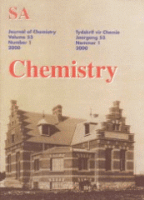
SOUTH AFRICAN JOURNAL OF CHEMISTRY-SUID-AFRIKAANSE TYDSKRIF VIR CHEMIE
Catalyzing Change in the World of ChemistrySouth African Journal of Chemistry (Suid-Afrikaanse Tydskrif vir Chemie), published by Bureau Scientific Publications, is a pivotal open-access journal that has been disseminating groundbreaking research in the field of chemistry since its inception in 1996. With an ISSN of 0379-4350 and an E-ISSN of 1996-840X, this journal serves as a vital platform for researchers and professionals seeking to share their work and engage with the global chemistry community. Recognized for its significant contributions, the journal holds a Q3 quartile ranking in the miscellaneous chemistry category as of 2023 and ranks #216 out of 408 in General Chemistry according to Scopus. The South African Journal of Chemistry is dedicated to advancing knowledge in the discipline by publishing a wide array of articles, reviews, and studies that address pertinent chemical research and applications. With open access options available since 2000, it fosters a collaborative environment, ensuring that research is accessible to all, thereby enhancing the visibility and impact of chemists' work across South Africa and beyond.
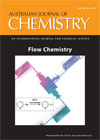
AUSTRALIAN JOURNAL OF CHEMISTRY
Unveiling innovative research in the heart of Australia.The Australian Journal of Chemistry, with an ISSN of 0004-9425 and an E-ISSN of 1445-0038, is a distinguished publication from CSIRO PUBLISHING, dedicated to advancing the field of chemistry since its inception in 1948. Based in Australia, this journal serves as a platform for original research articles, reviews, and innovative studies that encompass a wide spectrum of chemical disciplines, aiming to foster communication and collaboration among researchers globally. Despite its Q3 ranking in the Chemistry (Miscellaneous) category and standing at rank #236 in Scopus’ general chemistry classification, it remains an essential resource for professionals and students seeking to stay informed about emerging trends and discoveries in chemistry. The journal does not offer open access, emphasizing the premium quality of peer-reviewed content that adheres to rigorous academic standards. By bridging theory and practice, the Australian Journal of Chemistry continues to play a crucial role in shaping the future of chemical sciences.

CHINESE JOURNAL OF CHEMISTRY
Shaping the future of chemistry with impactful research.The CHINESE JOURNAL OF CHEMISTRY, published by WILEY-V C H VERLAG GMBH, is a distinguished peer-reviewed journal that has been contributing to the field of chemistry since its inception in 1990. With an impressive Q1 ranking in the Chemistry (miscellaneous) category and a Scopus rank of 67 out of 408, this journal is recognized for its rigorous scholarly standards and significant impact within the academic community. Renowned for publishing high-quality research, reviews, and insightful commentaries, the journal serves as a vital resource for researchers, professionals, and students keen on advancing their understanding of general chemistry and its applications. Although it does not offer open access, the journal remains an essential outlet for innovative chemistry research, attracting contributions from a global network of specialists. With its broad scope covering various aspects of chemistry and a commitment to fostering scientific dialogue, the CHINESE JOURNAL OF CHEMISTRY is poised to continue its role as a central pillar in the ever-evolving landscape of chemical sciences.

JOURNAL OF CHEMICAL RESEARCH
Fostering Innovation Through Rigorous Research.JOURNAL OF CHEMICAL RESEARCH, published by SAGE PUBLICATIONS LTD, serves as a pivotal platform for scholars and practitioners in the field of Chemistry. With its ISSN 1747-5198 and E-ISSN 2047-6507, this journal has established itself as a reliable source of innovative research since its inception in 2000. The journal's comprehensive scope encompasses various facets of chemical research, providing a broad spectrum of articles that foster scientific advancement and technological innovation. Ranked in the Q3 tier of miscellaneous chemistry journals in 2023, with a Scopus rank of #246 out of 408, it represents a solid outlet for emerging and established researchers alike. Although currently not an open-access journal, its rigorous peer-review process ensures that only high-quality studies are published, catering to the academic and professional community's demand for credible and impactful findings. Positioned in the vibrant research landscape of the United Kingdom, the JOURNAL OF CHEMICAL RESEARCH is dedicated to expanding the frontiers of chemical sciences and is an essential resource for anyone committed to advancing this dynamic field.

CHEMICAL RESEARCH IN CHINESE UNIVERSITIES
Navigating the Landscape of Chemistry ResearchCHEMICAL RESEARCH IN CHINESE UNIVERSITIES is a prominent academic journal dedicated to the dissemination of high-quality research in the field of chemistry and related educational methodologies. Published by HIGHER EDUCATION PRESS, this journal has established itself as a vital resource for researchers and professionals looking to stay at the forefront of chemical sciences. With an impressive impact factor and ranked in the Q2 quartile for both Chemistry and Education categories, it highlights significant advancements while maintaining rigorous peer-review standards. The journal's ISSN is 1005-9040 and its E-ISSN is 2210-3171, ensuring broad accessibility to its global readership. Although it does not offer open access, its contributions are vital to understanding the dynamics of chemistry research and education within and beyond China. With converged publication years from 1999 through to 2024, CHEMICAL RESEARCH IN CHINESE UNIVERSITIES continues to be an essential platform for innovative studies and critical discussions in the expanding realm of chemistry.
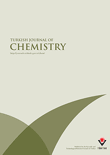
TURKISH JOURNAL OF CHEMISTRY
Unveiling New Frontiers in Chemical ResearchTURKISH JOURNAL OF CHEMISTRY, published by the Tubitak Scientific & Technological Research Council Turkey, serves as a significant platform for the dissemination of research in the diverse field of chemistry. Since its inception in 1996, this peer-reviewed journal has made substantial contributions to the body of knowledge within the field, currently holding a respectable Q3 ranking in the category of Chemistry (miscellaneous) as of 2023. Researchers and professionals alike rely on this journal for its wide-ranging discussions, innovative methodologies, and noteworthy findings pertinent to both fundamental and applied chemistry. With an ISSN of 1300-0527 and a commitment to promoting scientific progress, the journal is accessible to a global audience and encourages the open sharing of insights that drive advancements in chemistry. The extended timeframe of convergence until 2024 highlights the journal's dedication to fostering ongoing research and collaboration within the scientific community. As a valuable resource for researchers, professionals, and students, the Turkish Journal of Chemistry aims to inspire new discoveries and facilitate knowledge transfer in a dynamic and evolving discipline.

RUSSIAN CHEMICAL REVIEWS
Unveiling Innovations in Chemistry, One Review at a TimeRUSSIAN CHEMICAL REVIEWS, published by the esteemed ND Zelinsky Institute of Organic Chemistry, RAS, stands as a prominent platform for disseminating high-quality research in the diverse field of chemistry. With an ISSN of 0036-021X and an E-ISSN of 1468-4837, this journal has earned its place in the Q1 quartile of Chemistry (miscellaneous) for 2023, reflecting its outstanding impact and rigorous peer-review process. The journal encompasses a wide array of topics within chemistry, providing critical reviews that advance understanding and foster collaboration among researchers, professionals, and students globally. With its consistent publication since 1970, RUSSIAN CHEMICAL REVIEWS not only serves as a valuable resource for the latest advancements in the field but also plays a crucial role in shaping future research directions. The journal is based in the Russian Federation, with its office located at 47 Leninsky Pr, Moscow 119991, RUSSIA. As an essential reference for those in the chemical sciences, it provides an ideal avenue for authors looking to publish impactful reviews that contribute to the broader scientific community.